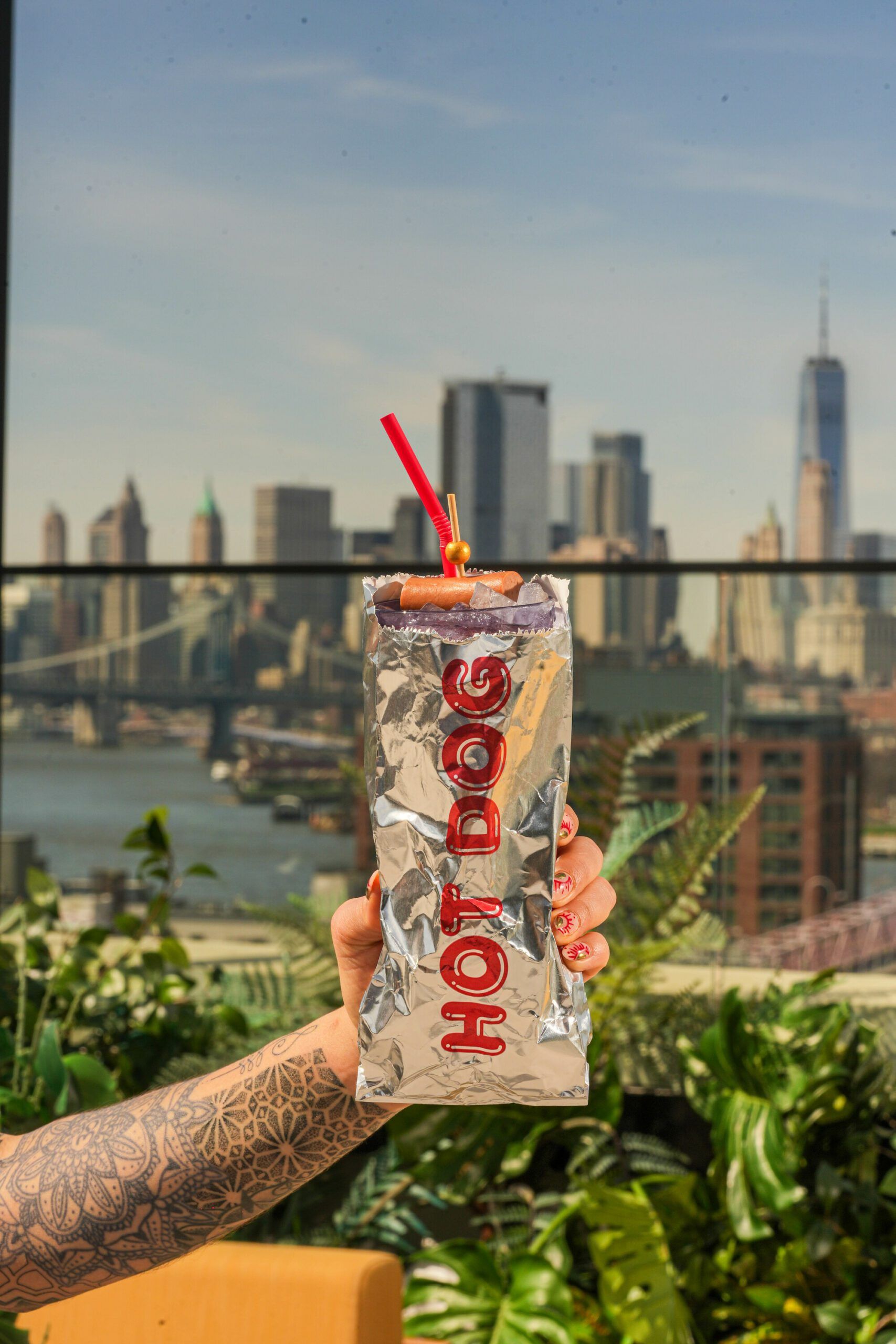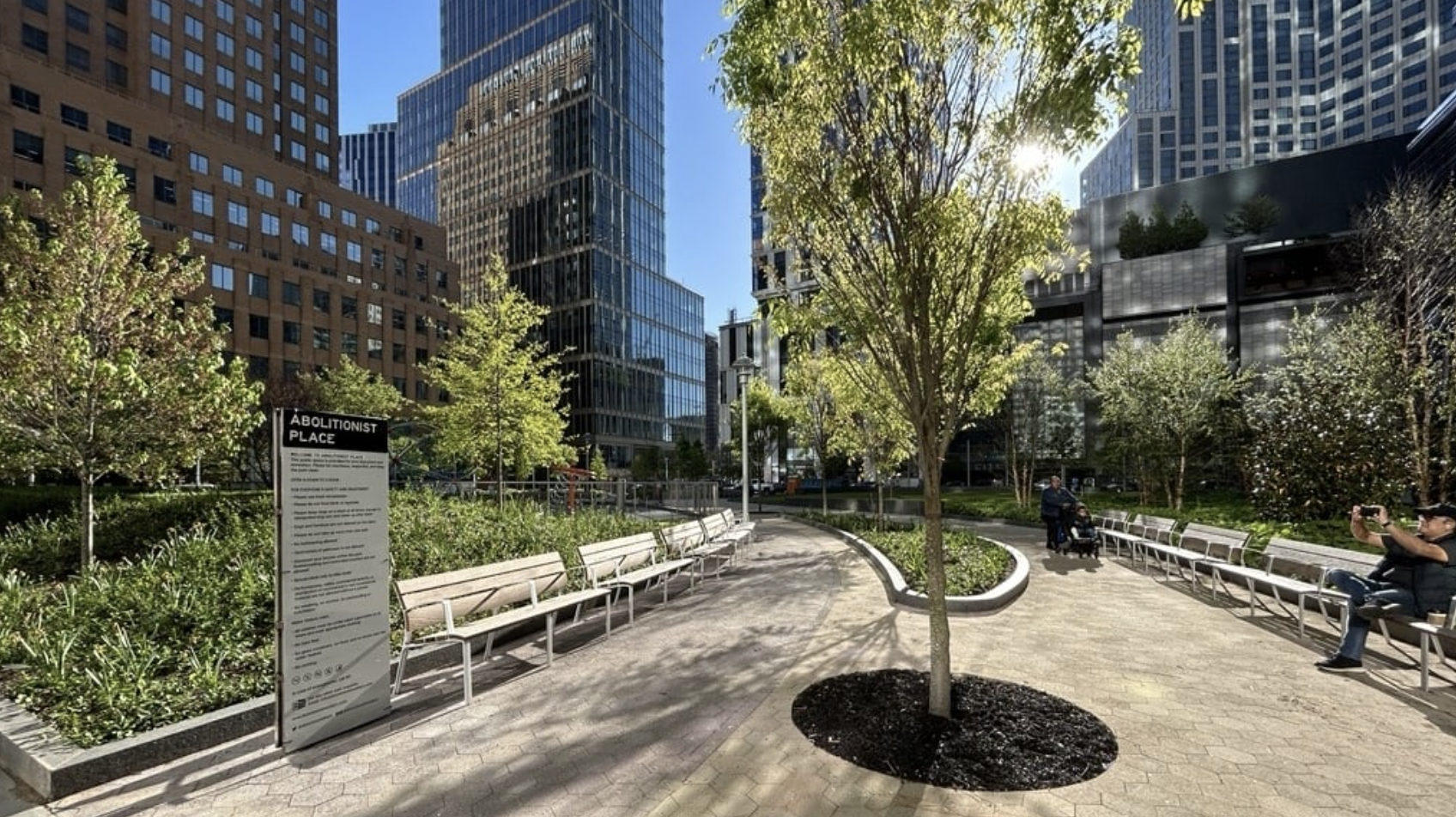City Parks Foundation: Enroll Your Kids in Free Sports Programs Now
The #1 source in the world for all things Harlem.
City Parks Foundation has opened registration for their free CityParks Play summer sports programs. New York City youth can enroll in an array of sports and fitness events throughout city parks spanning across Manhattan, Brooklyn, Queens, Staten Island, and the Bronx. Programs include free track lessons, golf lessons, soccer lessons, youth tennis programs and more. “CityParks Play continues to enhance the lives of kids at…
The post City Parks Foundation: Enroll Your Kids in Free Sports Programs Now appeared first on Harlem World Magazine.
This Williamsburg rooftop bar is now serving a hot dog cocktail

Hot dogs are having a bit of a moment—there’s an enormous frankfurter smack-dab in the middle of Times Square right now, in case you’ve somehow missed it. And while we’ve seen hot dog ice cream, churro hot dogs and hot dog fried chicken sandwich throughout the city’s frank-loving history, New York is now getting a hot dog cocktail. Yes, really.
RECOMMENDED: Try NYC’s best hot dogs, frankfurters and sausages from all over the five boroughs
LilliStar, the celestial Brooklyn rooftop bar from the creators behind Broken Shaker, reopened for the warm-weather season atop The Moxy Williamsburg on Monday, April 15, and they’re officially cheers-ing to summertime with a whimsical new cocktail creation: the “Hot Doggin’ It” ($18), a savory beverage meant to evoke the nostalgic flavors of one of New York’s most quintessential eats.
Don’t worry, you won’t find any actual dirty water in this drink—instead, it merely gives off the essence of the American classic via Vida, Lustau Vermut, tomato water and mustard seed agave. (There is a hot dog over on the food menu, served on a potato bun with red cabbage and harissa aioli for $12, in case you want the real thing.)
Keeping to theme, the “Hot Doggin’ It” cocktail is festively wrapped in an aluminum hot-dog wrapper and topped with a twee cocktail weenie.
It’s not the only food-themed drink on the menu. There’s also the “’Nana Pudding” ($20), a clarified cocktail reminiscent of the comforting dessert with notes of vanilla and coconut (crafted with Zacapa, D’usse, banana black tea, coconut foam, and vanilla wafer). There’s a “Fried Pickles and Ranch” bev ($18) made with Ilegal Mezcal, Aquavit, Fino, dill, coriander and lime oleo; as well as an “Elote Twisted Tea” (cotija-washed Abasolo, Nixta, black tea, lemon oleo and smoked paprika salt for $19)
If you want your drinks to, you know, not taste like food, the bar program also includes large-format cocktails like the shareable “Fun in the Sun” (Don Julio Blanco, chinola, salers, passionfruit, citrus, Chinese 5 spice) for $350. Check out that one, as well as the LilliStar space, below:



How To Rebuild Your Health After An Injury In Harlem And Beyond
The #1 source in the world for all things Harlem.
When we are fully healthy, we take things for granted, we do not understand how blessed we are that nothing hurts and that we can function normally without issues. That is why when someone gets hurt, they long for the time they were not, and they wish the pain would stop immediately. Wishful thinking cannot…
The post How To Rebuild Your Health After An Injury In Harlem And Beyond appeared first on Harlem World Magazine.
A new park just opened in downtown Brooklyn

It’s been two decades in the making, but it’s finally a reality: Abolitionist Place Park, a new 1.15-acre public green space that honors Brooklyn’s abolitionist history, is officially open at 225 Duffield Street.
As Brooklynites are probably aware of, the park was originally called Willoughby Square Park and discussions regarding its debut started as far back as 2004, when Downtown Brooklyn was first rezoned.
False starts and community issues stalled the project, which was officially renamed Abolitionist Place in 2021 when the Economic Development Corporation, who is behind the construction of the area, also pledged to fund a public art installation that would honor the 19th century abolitionist movement in Brooklyn (more on that later).

The time spent by officials to develop the effort has clearly paid off: according to Brownstoner, the park features a small dog run, an interactive water feature that will be turned on when the weather is warm, seating sections, a children’s playground and a central lawn, among other things.
The on-site public art installation will include two works by Brooklyn-based multimedia artist Kenseth Armstead: his “true North, Every Negro is a Star” will be a 16-by-33-by-33-foot steel dome structure commenting on the trans-Atlantic slave trade while “Conductors” will shed light on folks in the African diaspora “who helped the formerly enslaved people achieve freedom,” reports Brownstoner. Both pieces will debut in upcoming years.
The new destination will also be the site of public programs organized by the Downtown Brooklyn Partnership, the same entity tasked with maintaining the park. No exact details have yet been shared about the sorts of events that will take place on site, except for a story hour that kicks off today.
In terms of operating hours, the park will be closed between 1am and 6am every day and dogs won’t be allowed on the lawn at any point. Police officers will also be patrolling the area regularly.
It’s always a good day when a new green space makes its debut in this concrete jungle of ours!
LPC Streamlines Sidewalk Cafes For Historic District Restaurants In Dining Out NYC
The #1 source in the world for all things Harlem.
On May 7, 2024, the New York City Landmarks Preservation Commission (LPC) voted unanimously to approve amendments to LPC rules. The rules codify the Commission’s current regulatory review procedure for movable aspects of sidewalk cafes and expand the approach to include roadway cafes. LPC currently does not regulate temporary, movable aspects of sidewalk cafes in historic…
The post LPC Streamlines Sidewalk Cafes For Historic District Restaurants In Dining Out NYC appeared first on Harlem World Magazine.
Their businesses were transformed by a grant program for Black women. Its future is now at risk.

Originally published by The 19th
Bettina Benson was getting off a red-eye flight from Los Angeles, on her way home to Marietta, Georgia, when she received an email that altered the course of her business. She was a recipient of a 2023 grant from venture capital firm Fearless Fund, established to help Black women small business owners gain access to capital.
Benson, a self-taught designer, started the online clothing brand Chloé Kristyn in 2016. For her, receiving the grant was about alignment between the fund’s goals and her own mission: Fearless Fund understood the challenges Black women entrepreneurs face, she said.
“Running a business is inherently challenging, and as a woman of color, especially being self-funded and with the gaps in funding, challenges can be even more intense,” she said.
Black women entrepreneurs find it harder to access traditional forms of funding from banks and as well as grants and venture capital funding, according to a study conducted by Crunchbase, a company that provides statistics about businesses.
White men receive a disproportionate amount of venture capital funding when compared with women business owners. The funding gap between White men and Black women entrepreneurs is even bigger, with Black women receiving less than 1 percent of venture capital funding, the report found.
Founded by Arian Simone and Ayana Parsons in 2018, Fearless Fund has raised over $25 million to invest in Black women-owned businesses. The small venture capital firm has also awarded more than 350 grants through a number of different programs, one of which is the Strivers program that awards $20,000. Those grants have gone to Black women business owners to help close the racial disparity and give them the same opportunities for economic advancement, according to Simone.
But now, Fearless Fund’s ability to provide grants exclusively to Black women is at risk.
Edward Blum, a conservative activist who led the fight to strike down race-based affirmative action at colleges and universities, has sued Fearless Fund in federal court. Blum and his organization, the American Alliance for Equal Rights, claim that the fund’s Fearless Strivers Grant contest discriminates against other races and violates the Civil Rights Act of 1866, a law created during Reconstruction to support Black people, particularly those who had been previously enslaved.
In the months ahead, a group of judges on the U.S. Court of Appeals for the 11th Circuit in Florida will determine whether to stop Fearless Fund from awarding the $20,000 grants to Black women-owned businesses while the case is making its way through the legal system.
The lawsuit is part of a bigger conversation that worries civil rights activists across the country. They fear that if the Fearless Fund’s grant contest is struck down, it could also be a threat to other organizations focused on helping historically disadvantaged groups. The American Alliance for Equal Rights’ suits are just part of the effort by right-leaning groups to block diversity, equity and inclusion programs. America First Legal, an organization founded by Stephen Miller, who advised former President Donald Trump, has sued fintech firm Hello Alice over its grant to Black-owned small trucking companies.
Benson and other women who have benefited from Fearless Fund grants say the program has been life-changing.
Before receiving the grant, Benson had challenges with funding inventory for wholesale orders, marketing and attracting the right talent. She was in the process of filling some “pretty significant wholesale orders” when the funds arrived, providing a much-needed buffer.
“You fill those orders and then you get paid, but you have to have funds to be able to invest in production and your material,” Benson said.
The fund has allowed her business to grow, she said; she has even launched a new clothing line.
Janell Norris, CEO and founder of Selfie Skin Co., a skincare brand aimed at Black women, had tried for a grant from Fearless Fund a few times before she got one in July. She was in the process of recording a video at her friend’s house for another grant application when she learned that she was in the final round of the selection process.
Her friend still had the camera rolling when Norris received the news and cried tears of joy.
Norris received a $10,000 Fearless Fund grant, through a different program than the Strivers one being targeted by Blum. The money did not just impact her business, it also created opportunities for those around her, she said. It allowed her to expand her products from two to six and get help with both project management and marketing.
“I don’t think that people realize that when one brand gets a grant, it’s not just that one brand, you’re really supporting an ecosystem of other women minority-owned businesses,” she said.
Norris credits Fearless Fund for helping her brand gain visibility through the venture capital firm’s website, as well as allowing her to invest in organizations that serve underprivileged people, and her employees.
But not long after she received the grant, she said, uncertainty set in. A friend pointed out Blum’s lawsuit after she posted about the grant on social media. She worries about the entrepreneurs who were planning to apply for grants in the coming years.
“For me, it was OK, I got rejected, but you know what, I’m gonna just try it again next year, and I’m gonna work on it throughout the year until it comes back around,” Norris said. “To the entrepreneur who got that rejection in 2023, there’s nothing to look forward to in 2024 because someone has decided to attack programs that are beneficial to women of color.”
The post Their businesses were transformed by a grant program for Black women. Its future is now at risk. appeared first on New York Amsterdam News.


